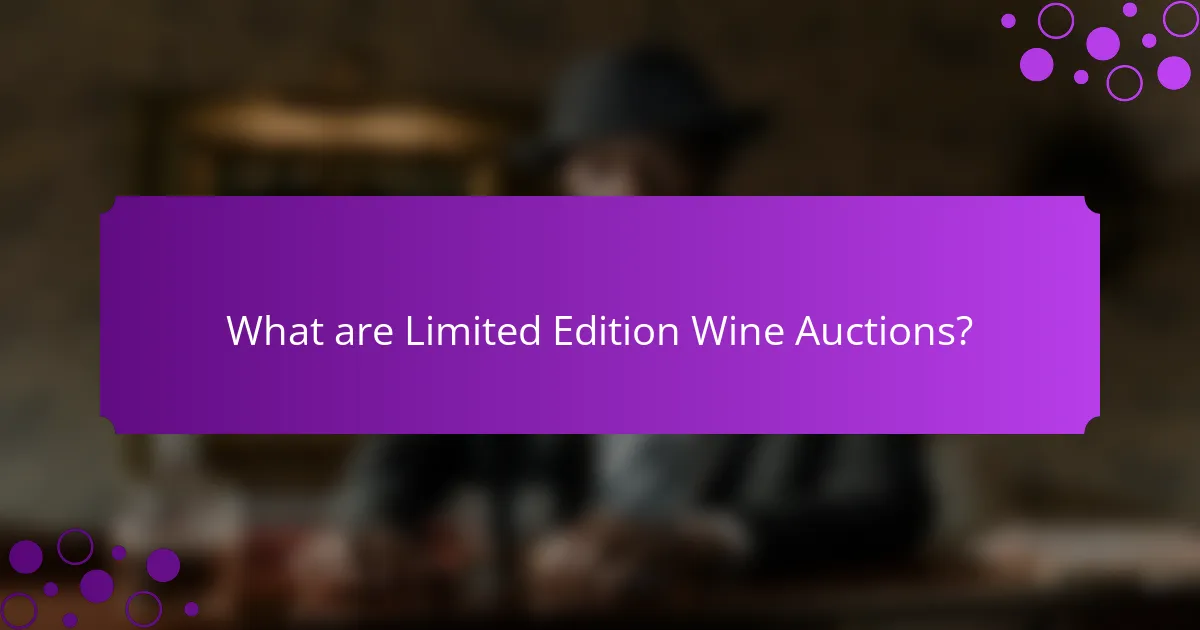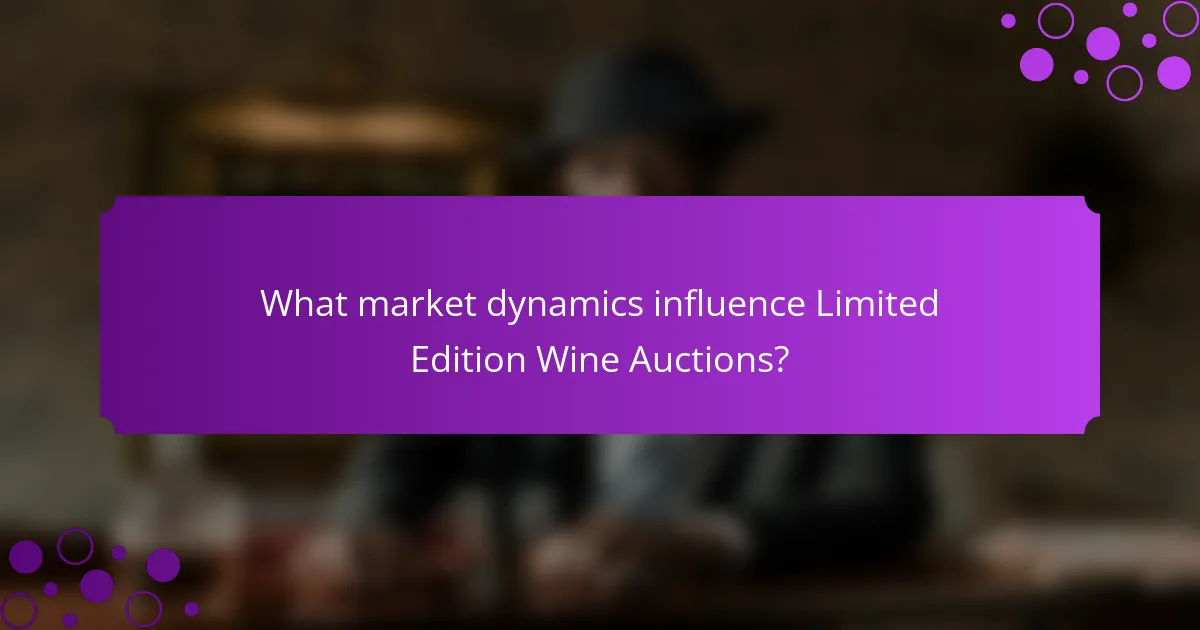
What are Limited Edition Wine Auctions?
Limited edition wine auctions are specialized events where rare and unique wines are sold to the highest bidder. These auctions often feature wines from prestigious vineyards or limited production runs. Participants can include collectors, investors, and enthusiasts seeking exclusive bottles. The auction process typically involves live bidding or online platforms. Prices can vary significantly based on the wine’s rarity and provenance. Historical data shows that limited edition wines often appreciate in value over time. This trend attracts buyers looking for both enjoyment and investment opportunities.
How do Limited Edition Wine Auctions operate?
Limited edition wine auctions operate by allowing collectors to bid on rare and exclusive wines. Participants register for the auction, either online or in person. Auctions typically feature a curated selection of wines, often with detailed descriptions and provenance information. Bidders place their bids within a specified timeframe. The highest bidder at the auction’s close wins the item. Payment and transfer of ownership occur after the auction ends. These auctions can attract significant interest due to the rarity of the wines. Market dynamics often influence pricing, with demand affecting final sale prices.
What are the key components of a Limited Edition Wine Auction?
The key components of a Limited Edition Wine Auction include a curated selection of rare wines, a defined auction format, expert appraisals, and a target audience of collectors. Curated selections often feature wines from prestigious vineyards or limited production runs, enhancing their desirability. The auction format can vary, including live, online, or hybrid models, impacting engagement and bidding dynamics. Expert appraisals provide credibility and set starting prices, ensuring informed bidding. The target audience typically consists of affluent collectors and connoisseurs, driving competition and higher bids. These components collectively shape the auction’s success and market appeal.
How does the auction process influence wine pricing?
The auction process significantly influences wine pricing by creating a competitive environment among bidders. This competition can drive prices higher than traditional retail settings. Auctions often feature limited edition wines, which increases their desirability and perceived value. The auction format allows buyers to set the price based on their willingness to pay, reflecting market demand. Additionally, the transparency of bidding can lead to price discovery, where the final price reveals the true market value of the wine. Historical auction data shows that rare wines can fetch prices significantly above their estimated values due to bidding wars. For instance, a bottle of rare Bordeaux can sell for over ten times its retail price at auction. Thus, the auction process plays a crucial role in determining wine prices by leveraging competition, demand, and rarity.
Why are Limited Edition Wines significant in the auction market?
Limited Edition Wines are significant in the auction market due to their rarity and exclusivity. These wines often come from prestigious vineyards and are produced in limited quantities. Their scarcity drives demand among collectors and enthusiasts. Auctions provide a platform for buyers to compete for these unique bottles. The competitive bidding can significantly increase the final sale price. Historical records show that certain limited edition wines have sold for thousands of dollars at auction. This trend demonstrates the value placed on exclusivity in the wine market. Additionally, limited edition wines often appreciate in value over time, making them attractive investments.
What factors contribute to the desirability of Limited Edition Wines?
Limited Edition Wines are desirable due to their scarcity, unique characteristics, and brand prestige. Scarcity increases demand as fewer bottles are available. Unique characteristics often include special blends or aging processes that enhance flavor profiles. Brand prestige plays a significant role, as well-known wineries can command higher prices. Collectors view Limited Edition Wines as investments, further driving desirability. Historical significance can also contribute, especially if a wine is linked to a notable vintage. Additionally, limited releases often come with distinctive packaging, appealing to collectors. These factors combined create a heightened interest and demand in the market for Limited Edition Wines.
How do collectors and investors value Limited Edition Wines?
Collectors and investors value Limited Edition Wines based on rarity, provenance, and market demand. Rarity is determined by the limited production numbers of specific vintages. Provenance refers to the wine’s history, including its origin and previous ownership. Market demand fluctuates according to trends and consumer preferences.
Price appreciation is often influenced by historical auction results. For instance, some limited edition wines have seen value increases of over 300% in a decade. The reputation of the winery also plays a crucial role in valuation. Well-regarded producers tend to have wines that appreciate more significantly.
Additionally, expert ratings and reviews can impact perceived value. High scores from wine critics often lead to increased demand. Collectors also consider the wine’s condition, including storage and packaging. All these factors collectively inform how collectors and investors assess the value of Limited Edition Wines.

What market dynamics influence Limited Edition Wine Auctions?
Limited edition wine auctions are influenced by several market dynamics. Demand for rare wines significantly drives auction prices. The limited availability of these wines creates scarcity, enhancing their perceived value. Market trends also impact buyer behavior, with collectors often seeking wines from specific regions or vintages. Economic factors, such as disposable income levels, affect bidding activity. Additionally, auction house reputation can influence buyer confidence and participation. Historical performance data shows that wines with strong provenance tend to fetch higher prices. Lastly, marketing efforts and promotional strategies by auction houses can shape buyer interest and engagement.
How does supply and demand affect auction prices?
Supply and demand directly influence auction prices. When demand exceeds supply, prices typically rise. Conversely, when supply surpasses demand, prices tend to fall. In limited edition wine auctions, scarcity often drives higher bids. For instance, a rare vintage may attract multiple bidders, escalating its price. Historical data shows that auction prices for limited wines can double or triple based on buyer interest. Additionally, market trends indicate that unique attributes, like provenance or ratings, can heighten demand further. Thus, understanding supply and demand dynamics is crucial for predicting auction outcomes.
What trends are currently shaping the Limited Edition Wine market?
The Limited Edition Wine market is currently shaped by several key trends. Increased consumer interest in unique and exclusive offerings drives demand. Sustainability in wine production is gaining importance among buyers. Digital platforms facilitate access to limited releases, enhancing market reach. Auction houses are expanding their online presence to attract global bidders. Collectors are focusing on provenance and authenticity to ensure investment value. The rise of experiential marketing is creating memorable brand interactions. Additionally, the influence of social media is shaping consumer perceptions and preferences. These trends collectively reflect a dynamic market responding to evolving consumer behaviors and values.
How do economic factors impact auction outcomes?
Economic factors significantly influence auction outcomes. They determine buyer willingness and purchasing power. For instance, during economic downturns, bidders may have less disposable income. This can lead to lower bids and reduced competition. Conversely, in a thriving economy, increased wealth can drive up auction prices. Market demand for limited edition wines also fluctuates based on economic conditions. High demand during prosperous times can lead to higher final sale prices. Studies indicate that economic indicators, such as GDP growth, correlate with auction results. Therefore, economic factors play a crucial role in shaping the dynamics of auction outcomes.
What role do auction houses play in the Limited Edition Wine market?
Auction houses serve as critical intermediaries in the Limited Edition Wine market. They facilitate the buying and selling of rare wines through organized auctions. Auction houses provide a platform for collectors and investors to access exclusive wine offerings. They also establish market value through competitive bidding processes. This helps to determine current pricing trends for limited edition wines. Furthermore, auction houses often authenticate and appraise the wines they sell. They contribute to the overall transparency and trust in the wine market. Their expertise attracts serious buyers, enhancing the market’s credibility. Overall, auction houses play a vital role in connecting sellers and buyers in the Limited Edition Wine sector.
How do auction houses determine the starting prices for wines?
Auction houses determine the starting prices for wines based on several factors. They consider the wine’s provenance, which includes its history and previous ownership. The rarity of the wine also plays a crucial role in pricing. Market demand influences starting prices, as popular wines may command higher initial bids. Auction houses analyze past auction results to establish price benchmarks. Expert appraisals provide insights into the wine’s quality and condition. Additionally, current market trends and economic conditions are taken into account. These elements combined help auction houses set a competitive and appealing starting price for each wine.
What marketing strategies do auction houses use to attract bidders?
Auction houses use targeted marketing strategies to attract bidders. They often utilize online platforms to reach a broader audience. Social media campaigns showcase featured items and create excitement. Email newsletters inform subscribers about upcoming auctions and exclusive lots. High-quality photography enhances visual appeal and showcases the items effectively. Collaborations with wine influencers increase credibility and visibility. Personalized invitations to VIP bidders foster a sense of exclusivity. Data analytics help identify bidder preferences and tailor marketing efforts accordingly. These strategies have proven effective in increasing bidder engagement and auction participation.

What pricing strategies are effective in Limited Edition Wine Auctions?
Effective pricing strategies in limited edition wine auctions include reserve pricing, dynamic pricing, and psychological pricing. Reserve pricing sets a minimum bid to ensure sellers receive a desired return. This strategy protects sellers from undervaluing their rare wines. Dynamic pricing adjusts bids based on real-time demand, maximizing revenue potential. It allows for flexibility as bidders compete. Psychological pricing leverages perceived value, often pricing wines just below a round number. This can encourage higher bids by creating a sense of value. These strategies are supported by market analysis showing increased bidder engagement and higher final sale prices in auctions that implement them.
How do reserve prices influence bidding behavior?
Reserve prices set a minimum threshold for bids in auctions. They influence bidding behavior by establishing a baseline that bidders must meet or exceed. When reserve prices are high, bidders may hesitate to participate. This hesitation can lead to fewer bids and lower overall auction activity. Conversely, lower reserve prices can encourage more bidders to enter the auction. Research indicates that reserve prices can create a psychological barrier. Bidders often perceive higher reserve prices as a signal of value. This perception can affect their willingness to bid aggressively. In summary, reserve prices play a crucial role in shaping bidder psychology and auction dynamics.
What are the implications of setting a high or low reserve price?
Setting a high reserve price can lead to fewer bids and potentially unsold items. A high reserve price may deter bidders who perceive the item as overpriced. Conversely, a low reserve price can attract more bidders and increase competition. This can lead to higher final sale prices if bidders engage in bidding wars. However, a very low reserve price risks selling the item below its market value. The implications also include the auction house’s reputation, as unsold items can negatively impact future auctions. Overall, the choice of reserve price directly influences bidder behavior and auction outcomes.
How can auctioneers leverage bidding increments to maximize revenue?
Auctioneers can leverage bidding increments to maximize revenue by strategically setting the increments based on the value of the items. Smaller increments can encourage more participation in the early stages of bidding. This approach can create a competitive atmosphere, driving up the final sale price. Conversely, larger increments at higher price points can help to expedite the bidding process once interest is established. Research indicates that adjusting increments based on the perceived value of limited edition items can lead to higher overall sales. For instance, a study found that auctions with tailored bidding increments achieved up to 20% higher final sale prices compared to those with fixed increments. By analyzing bidder behavior and item valuation, auctioneers can optimize increments to enhance revenue effectively.
What psychological factors affect bidders in Limited Edition Wine Auctions?
Psychological factors affecting bidders in Limited Edition Wine Auctions include scarcity, social proof, and emotional attachment. Scarcity creates urgency, leading bidders to perceive limited availability as more valuable. This phenomenon is supported by Cialdini’s principles of persuasion, where scarcity increases desire. Social proof influences bidders by showcasing the behavior of others, making them more likely to bid if they see others participating. Emotional attachment arises from personal connections to the wine or the brand, driving bidders to invest more emotionally and financially. These factors collectively shape bidding behavior, impacting final auction prices.
How does the perception of value impact bidding decisions?
The perception of value significantly impacts bidding decisions in limited edition wine auctions. Bidders assess the perceived value based on factors like rarity, quality, and provenance. Higher perceived value often leads to increased willingness to bid aggressively. For instance, wines with a prestigious history or accolades typically attract higher bids. Research shows that perceived value influences emotional attachment, driving bidders to compete for desirable lots. Additionally, social proof, such as past auction prices, can elevate perceived value. Therefore, strong perception of value can create bidding wars, ultimately affecting final sale prices.
What common biases influence bidders during auctions?
Common biases that influence bidders during auctions include the winner’s curse, anchoring bias, and overconfidence. The winner’s curse occurs when bidders overpay for an item due to competition, leading to regret. Anchoring bias involves relying heavily on the initial price estimate, which can skew bidding behavior. Overconfidence leads bidders to believe they can predict outcomes better than they actually can. Research shows these biases can significantly affect auction outcomes. For instance, a study by Hossain and Morgan (2006) found that bidders often overestimate their value assessments, leading to inflated bids. Such biases can distort market dynamics in limited edition wine auctions.
What best practices should bidders follow in Limited Edition Wine Auctions?
Bidders in Limited Edition Wine Auctions should conduct thorough research on the wines being auctioned. Understanding the provenance, vintage, and ratings of each wine is crucial. Bidders should set a budget before participating to avoid overspending. Monitoring auction trends and previous sale prices helps in making informed bids. It is advisable to register early for the auction to ensure participation. Bidders should also pay attention to the auction house’s reputation and buyer’s premium fees. Engaging with the auction community can provide valuable insights and tips. Lastly, bidders should remain patient and avoid emotional bidding to secure the best deals.
How can bidders research and select the best wines to bid on?
Bidders can research and select the best wines to bid on by analyzing wine ratings and reviews. Resources like Wine Spectator and Robert Parker provide detailed assessments. Bidders should also consider the wine’s provenance, including its origin and storage conditions. Auction house catalogs often include this information. Understanding market trends is crucial; bidders can track past auction results for similar wines. Networking with sommeliers and wine experts can provide valuable insights. Finally, attending tastings allows bidders to evaluate wines firsthand. This multi-faceted approach enhances decision-making in wine auctions.
What strategies can bidders employ to win auctions at favorable prices?
Bidders can employ several strategies to win auctions at favorable prices. First, they should conduct thorough research on the wines being auctioned. Understanding the market value helps bidders set realistic price limits. Second, bidders can attend preview events to assess the condition and quality of the wines. This enables informed bidding decisions. Third, setting a strict budget prevents overspending during bidding wars. Fourth, bidders can use proxy bidding to automate their bids, ensuring they remain competitive without emotional influence. Fifth, timing is crucial; bidding late in the auction can deter other bidders. Finally, building relationships with auction houses can provide insights into upcoming lots and bidding trends. These strategies have been shown to increase the likelihood of securing wines at lower prices.
Limited Edition Wine Auctions are specialized events where rare and unique wines are sold to the highest bidder, attracting collectors and investors. This article explores the operational dynamics of these auctions, including key components, pricing strategies, and market influences. It examines how factors such as rarity, provenance, and market demand affect wine pricing and desirability. Additionally, the article highlights the role of auction houses in facilitating sales and the psychological factors that impact bidding behavior. Understanding these elements provides insights into the complexities of the limited edition wine auction market.